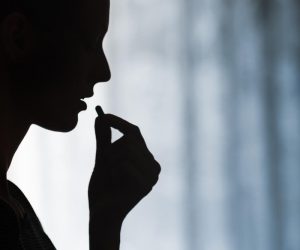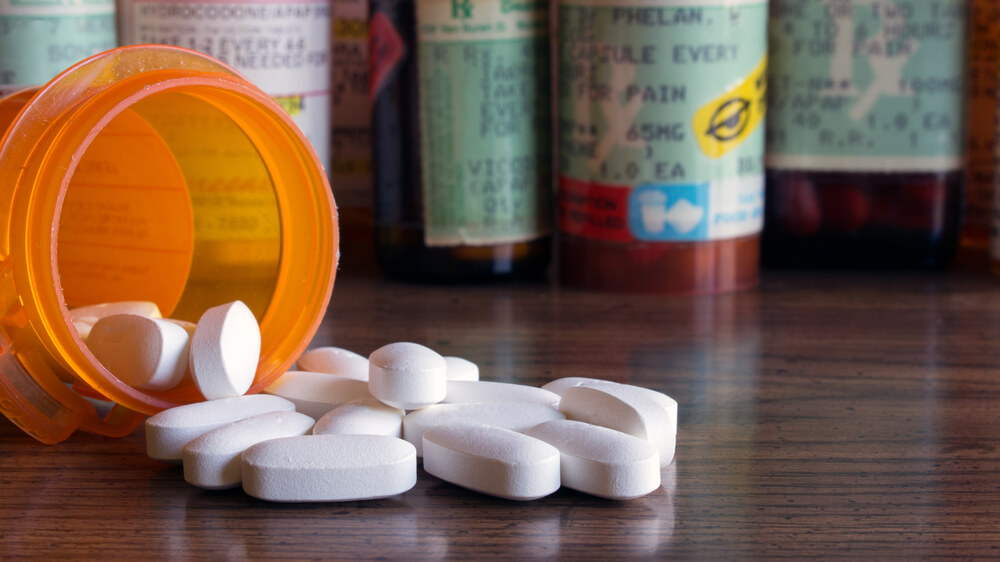25 Signs of Opioid Addiction

What Are Opioids Prescribed For?
Opioids are a type of narcotic painkiller medication given to people experiencing high levels of pain, often after a serious accident or due to a serious illness. Because they have a constipating effect, they are sometimes given to treat diarrhea and may also be found in some cough medications.
Opioid prescriptions come in several formats, including:
- Tablets
- Syrups
- Capsules
- Liquids for intravenous injection
- Nasal spray
- Skin patches
- Suppositories
These powerful prescription drugs work by bonding with already-existing opioid receptors in the brain and producing endorphins while increasing sedation and suppressing the emotional response to pain, often producing a euphoric effect. Because of this, doctors are trained to watch for signs of opioid addiction in their patients. Along with euphoria and relaxation, opioid medications can also make a person experience:
- Nausea and vomiting
- Sedation
- Difficulty breathing and sleep apnea
- Impotence
- Headaches
- Dizziness or disorientation
- Confusion
When abused, these drugs can create a serious physical dependence, causing severe withdrawal symptoms in users who try to stop using them, resulting in addiction. For this reason, most people are only prescribed opioid drugs for short-term treatment of acute pain or when other medications do not work for those with chronic pain. If you are prescribed an opioid medication, it is crucial to only use it as prescribed, with a medically supervised plan to taper off its use.
Long-term abuse of opioid drugs can lead to:
- Serious digestive issues
- Liver damage
- Infertility in women
- Physical dependence
- Substance use disorder
- Overdose with hypoxia leads to brain damage, coma, and death
Types of Opioids
Opioids can be synthetically made from chemicals in a lab or produced using natural opium from the poppy plant. There are two major categories of opioid drugs: prescription and illicit, but both are highly addictive if abused.
The most commonly prescribed opioid medications include:
- Percocet
- Dilaudid
- Codeine
- Hydrocodone
- Oxycodone
- Morphine
- Hydromorphone
Illicit opioids are manufactured in illegal laboratories for drug traffickers to sell on the streets. Some of the most commonly found illicit opioid drugs include:
- Heroin
- Fentanyl
These can be found in pill, liquid, or powder form and may even be sold falsely as other designer drugs; for example, illicit fentanyl may be pressed into a pill that is then sold as ecstasy at a party, or you may purchase what you think is Xanax through social media connections, but it may be cut with opioids to increase addictiveness and intensity. There is no true way to test the contents of drugs purchased on the street; even fentanyl test strips can miss analog versions like carfentanil.
 25 Signs of Opioid Addiction
25 Signs of Opioid Addiction
Some common signs of opioid addiction include:
- Lying to medical professionals about pain levels or lost medication to get more opioids
- Taking opioid drugs not as prescribed by the doctor (taking too many at once, taking them more often than prescribed, etc)
- Having multiple doctors (“doctor shopping”) and going to multiple pharmacies to get more opioid prescriptions, ensuring they have a “backup” supply “just in case”
- Isolating themselves from loved ones who may notice their new behaviors
- Marked poor performance at work or school, including unexplained absences and low motivation
- IV users will have “track marks” or puncture wounds and sores at injection sites
- Stealing or buying other people’s medications
- Experiencing stomach issues and digestive problems like constipation, nausea, or vomiting
- Impaired judgment, acting impulsively or in an unsafe manor
- A disregard for the harm caused to themselves and others
- Continuing to use opioid drugs even when they begin to cause serious health issues or problems at work, school, or in personal relationships
- Losing their job, home, and social connections due to drug use
- Noticeable change in appearance (weight gain or loss)
- Hanging out with a new friend group, who are also drug users
- Decreased libido
- Excessive drowsiness or “nodding off” at all times of the day
- Experiencing frequent flu-like symptoms
- Taking less care of themselves (poor hygiene, sleeping irregularly, etc.)
- Worsening mental health issues like depression, anger issues, paranoia, and emotional dysregulation
- New financial difficulties, asking to borrow money or stealing to pay for opioids
- Slowed thinking, with difficulty concentrating or making decisions
- Being unable to get through the day without using opioids
- Feeling obsessed with opioid drugs, with a lot of time spent planning how to get more
- Experiencing strong drug cravings or withdrawal symptoms when they do not have access to opioid drugs
- A loss of control over their use and being unable to quit even when they really want to
Discover how Naloxone can save a life during an opioid overdose here:
WhiteSands Alcohol and Drug Rehab Can Help Those Suffering from Opioid Addiction
Opioid use disorder is treatable, and at the WhiteSands Alcohol and Drug Rehab center, our staff is dedicated to ensuring each person who walks through our doors is treated with respect, dignity, and care, with medical treatments, therapy, holistic care, exercise, and nutrition programs and more provided as needed to help overcome addiction and start down a new path to sobriety.
Our luxury treatment facility makes inpatient treatment as comfortable and safe as possible, emphasizing evidence-based therapies to ensure the underlying causes of addiction are treated as you rest, relax, and heal your body, mind, and spirit away from the triggers and temptations of everyday life. You will stay in a comfortable private residence, with access to all our amenities, healthy delicious food, and a variety of fun activities as you gain new healthy habits and implement beneficial routines into your life.
Some of the treatments we have to include:
- Medical detox programs provide full-time medical care and prescription medications to make your initial detox from opioid drugs as comfortable as possible and to keep you safe from serious withdrawal symptoms
- Individual and group therapy
- Family therapy programs
- Dual diagnosis for those needing mental health treatments
- Behavioral therapy like cognitive behavioral therapy
- Yoga, massage, mindfulness, art therapy, and other holistic programs
- Nutrition and healthy eating programs
- Exercise programs including weight lifting, swimming, or boxing in a full-sized gym with trainers
- Relapse prevention training
- Long-term aftercare and follow-up appointments
We have medication-assisted treatment (MAT) programs that provide medications, clinical care, counseling, and therapy, with prescription doses of FDA-approved medications that will keep you comfortable and stable as you begin a slow taper off of opioid drugs. MAT programs can take weeks, months, or years depending on your unique circumstances, and we will ensure you are getting the long-term care you need during this time.
Our outpatient programs are tailored to each individual, with partial hospitalization programs (PHP) and intensive outpatient programs (IOP) designed to work with your lifestyle and preferences as you transition back into your life as a sober individual. You will have life-long connections to peer support, therapy, and our recovery resources, ensuring you are never alone in your sobriety.
If you have noticed signs of opioid addiction in yourself or a loved one, do not hesitate to call our team anytime. We can help guide you toward what your next step can be, help you verify insurance coverage, and get you started on the road to recovery with detox plans, inpatient rehab, or outpatient treatment that is right for your unique needs as an individual. We are here for you, and we can help.
If you or a loved one needs help with abuse and/or treatment, please call the WhiteSands Treatment at (877) 855-3470. Our addiction specialists can assess your recovery needs and help you get the addiction treatment that provides the best chance for your long-term recovery.

